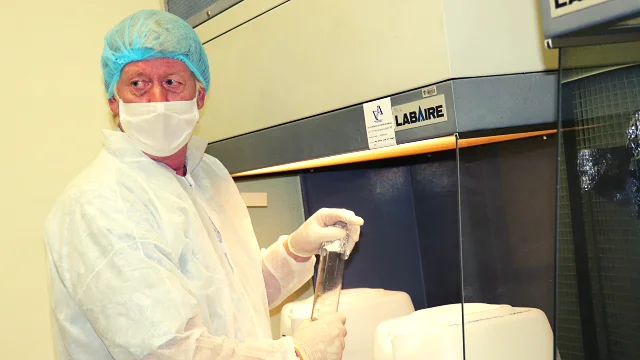
Professor Rod Walker from the Rhodes University Faculty of Pharmacy has been named the recipient of the prestigious 2021 Vice Chancellor’s Distinguished Award for Community Engagement. He describes this honour as “a wonderful recognition of the many who supported, facilitated and assisted in ensuring the success of the sanitiser project”.
Over the past two years, the professor and his team have been hard at work producing and distributing hand sanitiser, manufactured according to the World Health Organisation guidelines, to healthcare workers and the most vulnerable members of society.
A registered pharmacist and researcher with a long career in pharmaceutical product development, Prof Walker partnered with several role players to set up a small-scale hand sanitiser manufacturing plant in one of the laboratories in the Faculty of Pharmacy at Rhodes University, soon after the COVID-19 pandemic hit.
“I had a handful of postgraduates assisting initially. We were then joined by the elective class (approximately 12 students) once they had returned to campus for their practical courses in 2020 and 2021. Both my daughters also assisted with cleaning, de-labelling, and re-labelling containers. It was a team effort. Some days, we only had a couple of people, and other days we were a larger group. But whoever was available worked hard to do what had to be done,” explained Prof Walker.
Despite an often-limited team, 14 562 litres of sanitiser have been produced in the facility to date. “This amounts to more than 14 million hands being sanitised,” Prof Walker stated.
The entire operation was undertaken with the necessary documentation and compliance for manufacturing a product that was going to be used by health care professionals and the public. “I used batch records for traceability, kept records of where the sanitiser was being sent and records relating to the receipt and use of ethanol,” Prof Walker said.
He found it particularly meaningful to assist locally – the hospitals and clinics of the Sarah Baartman District, specifically Settlers and Fort England Hospitals. “Since we use these facilities for teaching, it was a privilege to assist,” said Prof Walker. He added that supporting local retirement homes was also rewarding, as these organisations have limited funding.
“As the pandemic continued, the project grew to include elements of knowledge transfer, service-learning, and a wide reach to diverse communities,” said Di Hornby, Director of the Division of Community Engagement at Rhodes University (RUCE).
Several community partners donated either funds, materials (such as ethanol), expertise, or time to assist Prof Walker and his team. Partners included the Eastern Cape Department of Health (ECDoH), the Department of Rural Development and Agrarian Reform, the South African Institute for Aquatic Biodiversity (SAIAB), the Unbunye Foundation, the Dohne Agricultural Research Institute, the Faculty of Pharmacy and Departments of Physics and Chemistry at Rhodes University.
“Without SAIAB, we would not have been successful. Through Dr Angus Paterson, their willingness to allow us access to ethanol and to engage with SARS to permit transfer to our laboratory, greatly facilitated the process. The volumes we have made could not have been achieved without their support. The ECDoH provided glycerol and hydrogen peroxide, as did our Faculty of Pharmacy and our Department of Chemistry. Our research office facilitated the purchase of a pump, which allowed us to increase the manufacturing output. A call to the University community for a stirrer resulted in one being built in the Physics Department, thanks to Professor Justin Jonas and Andy Youthead. In addition, one of the equipment suppliers I purchase materials and equipment from for research donated a stirrer worth R 35 000,” Prof Walker explained.
The distribution of this hand sanitiser has reached far beyond the boundaries of the University, Makhanda or even Makana District. From healthcare workers in busy hospitals to rural communities and about 3000 farmers have benefited. Furthermore, based on this project, a new Service-Learning component has been developed and included in an Industrial Pharmacy elective.
“Prof Walker’s initiative truly embodies the nexus of community engagement, teaching, learning and research at Rhodes University,” said Hornby. “He is commended for his ability to harness years of academic knowledge and to quickly provide an appropriate and effective response to a global and local crisis. The rigour of the process of setting up the project and sustaining it through reciprocal partnerships and teaching and learning and research endeavours are acknowledged. Moreover, the emotional weight that this project carried at a time of great fear, anxiety and tragedy is greatly appreciated.”
The Award to Prof Walker will be made at the April Graduation in 2022. Prof Walker will then give a public lecture on his work on 10 May 2022, during Community Engagement Week. More specific details will be shared in due course.
